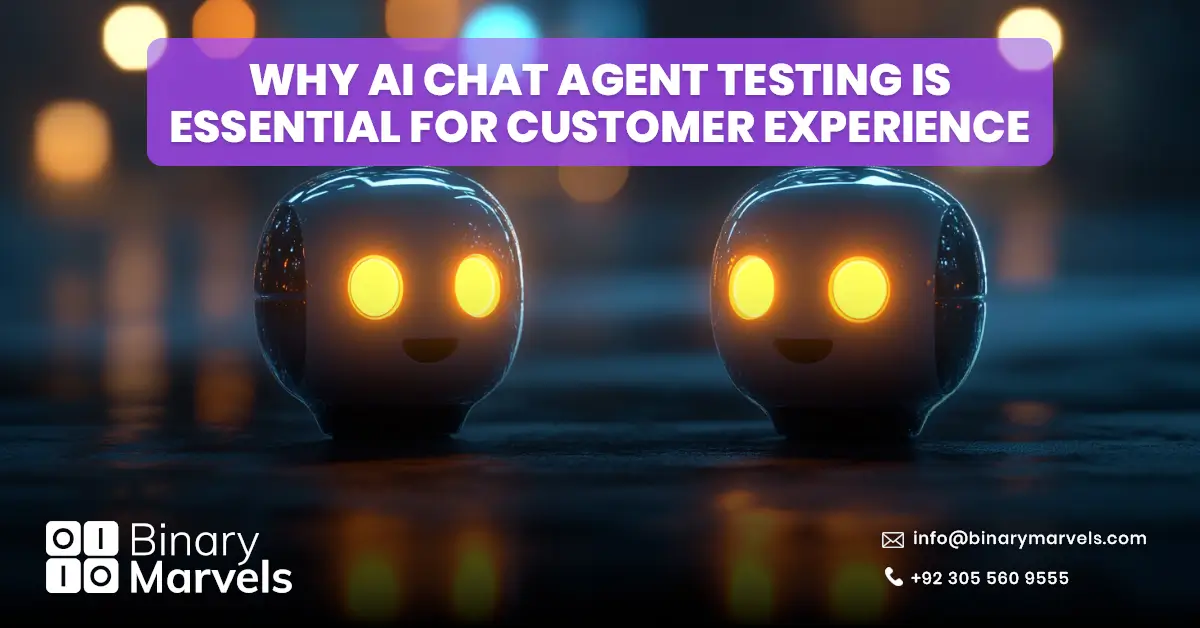
Tired of waiting on hold or repeating yourself to customer service reps? What if your business could answer every call instantly—with a voice that listens, understands, and solves problems around the clock? That’s exactly what this guide to AI voice agent development is all about. AI voice agents are redefining the way businesses communicate, offering fast, natural, and intelligent conversations that boost customer satisfaction and lower operational costs.
Whether you’re running a call center, managing a fast-growing startup, or scaling enterprise operations, AI voice agents offer a powerful way to automate interactions without losing the personal touch. In this guide, you’ll discover what AI voice agents are, the key technologies behind them, how they’re developed, real-world use cases, and how to choose the right partner to build one—so you can stay ahead in the age of conversational AI.
Also Read: Top 10 AI Companies in Pakistan
What Are AI Voice Agents?
AI voice agents are intelligent software programs designed to interact with people using natural spoken language. Unlike traditional phone systems that rely on fixed menus or touch-tone responses, AI voice agents can understand, interpret, and respond to a wide range of questions and commands—almost like talking to a real person.
It’s important to understand how AI voice agents differ from other similar technologies. Traditional IVRs (Interactive Voice Response) follow strict, pre-set scripts and offer limited options. Virtual assistants, like Siri or Alexa, are more general-purpose and handle a variety of tasks beyond phone calls. AI voice agents, on the other hand, are specialized for handling business-specific voice interactions in real time, providing tailored responses that sound natural and human-like.
One of the biggest advantages of AI voice agents is their ability to interact continuously and naturally with customers 24/7. They don’t get tired or need breaks, meaning your business can offer consistent support and quick resolutions anytime, improving customer experience and efficiency.
Also Read: How to Train AI for Effective Customer Service?
Benefits of AI Voice Agent Development for Businesses
Developing AI voice agents brings a wide range of advantages that can transform how businesses interact with their customers. One of the most significant benefits is the reduction in operational costs. By automating routine calls and inquiries, companies can save on staffing expenses while still providing high-quality service.
AI voice agents also enhance customer service and retention by delivering fast, accurate, and personalized responses. Customers no longer have to wait on hold or repeat information, which leads to a smoother experience and greater loyalty.
Another key benefit is the scalability and multilingual support AI voice agents offer. Whether your business is growing rapidly or serving a diverse customer base, these agents can handle increasing call volumes and communicate fluently in multiple languages.
Finally, AI voice agents provide faster response times and higher customer satisfaction by resolving queries quickly and efficiently. This not only improves the customer experience but also frees up human agents to focus on more complex tasks, boosting overall productivity.
Key Technologies Behind Smart Voice Agent Development
Building powerful AI voice agents depends on a combination of advanced technologies working seamlessly together to create smooth, natural conversations.
Natural Language Processing (NLP) enables the agent to understand the meaning, context, and intent behind what users say. This makes interactions feel human and relevant.
Automatic Speech Recognition (ASR) converts spoken words into text the system can interpret, even when users have different accents or background noise is present.
Text-to-Speech (TTS) technology generates natural, lifelike spoken responses, allowing the voice agent to communicate clearly and engagingly.
AI and Machine Learning Models are the brains behind the operation—they analyze data, learn from past interactions, and improve the agent’s responses over time.
Backend integrations with systems like CRMs, APIs, and databases connect the voice agent to your business’s existing tools, enabling real-time access to customer information and allowing the agent to perform complex tasks like booking appointments or checking order status.
These technologies combine to create AI voice agents that are intelligent, responsive, and deeply connected to your business needs.
Step-by-Step Guide to Building an AI Voice Agent
Building a successful AI voice agent starts with careful planning and execution. Follow these key steps to develop a voice agent tailored to your business needs:
Step 1: Define Your Use Case
Identify the primary purpose of your AI voice agent. Whether it’s customer support, lead qualification, appointment booking, or order tracking, having a clear use case guides the entire development process.
Step 2: Choose a Development Platform or Partner
Select the right tools or a trusted development partner that specializes in AI voice agent solutions. Consider their expertise, technology stack, and ability to customize the agent to your requirements.
Step 3: Create Voice Scripts and Conversation Flows
Design natural, engaging dialogue scripts and map out conversation flows to ensure the agent can handle different user inputs smoothly and deliver helpful responses.
Step 4: Train the AI Model with Relevant Data
Feed the AI with quality data related to your business domain. Training the model helps it understand context, recognize intents, and respond accurately.
Step 5: Integrate with Telephony Systems, CRMs, and Analytics
Connect your AI voice agent to existing infrastructure such as phone systems, customer relationship management (CRM) platforms, and analytics tools to enable seamless functionality and performance tracking.
Step 6: Test, Deploy, and Continuously Optimize
Before going live, thoroughly test the agent to catch any issues. After deployment, monitor performance and collect user feedback to continuously improve and adapt the voice agent for better results.
Common Pitfalls and How to Avoid Them
While developing AI voice agents offers great benefits, there are common challenges that can impact success if not addressed properly.
Poor Voice Recognition Due to Lack of Data
AI models need diverse, high-quality data to accurately understand different accents, speech patterns, and environments. Insufficient or biased data can lead to misinterpretations and user frustration. To avoid this, gather comprehensive datasets and continuously update the model with real-world interactions.
Overly Complex Conversation Flows
Designing complicated or rigid dialogue paths can confuse users and lead to poor experiences. Keep conversation flows intuitive and flexible, allowing the agent to handle unexpected responses gracefully.
Compliance and Data Privacy Concerns
Handling sensitive customer information requires strict adherence to data privacy laws like GDPR or CCPA. Ensure your AI voice agent development includes robust security measures and transparent data handling policies.
Lack of Multi-lingual or Local Dialect Support
Ignoring language diversity can limit your agent’s effectiveness in global or multicultural markets. Plan for multi-lingual capabilities and support for local dialects to serve a broader audience and improve accessibility.
By anticipating these pitfalls and planning accordingly, you can build AI voice agents that deliver smooth, secure, and satisfying customer experiences.
Popular Use Cases Across Industries
AI voice agents are transforming customer interactions across a variety of industries. Here are some of the most common applications:
BPOs & Call Centers
AI voice agents handle call deflection by managing routine inquiries and providing 24/7 inbound support, freeing up human agents to focus on complex issues and improving overall efficiency.
Healthcare
Voice agents assist with appointment scheduling, patient reminders, and follow-ups, helping reduce no-shows and improving patient engagement with timely communication.
E-Commerce
From order tracking to returns processing, AI voice agents offer quick, automated responses that keep customers informed and satisfied without the need for manual support.
Banking & FinTech
Voice agents provide secure access to account information, balance checks, transaction alerts, and fraud notifications, offering convenient and safe banking services around the clock.
Travel & Hospitality
Handling booking confirmations, travel inquiries, and customer requests, AI voice agents enhance the traveler experience by providing instant assistance anytime, anywhere.
These use cases show how versatile and valuable AI voice agents can be, driving better service and efficiency in many sectors.
Also Read: Top 10 Reasons to Hire a Dedicated AI Development Team in 2025
The Future of AI Voice Agents: What’s Next?
The future of AI voice agent development promises exciting advancements that will deepen the way humans and machines communicate.
AI Voice Agents with Emotional Intelligence
Next-gen voice agents will not only understand words but also detect emotions like frustration, happiness, or confusion. This emotional intelligence will enable more empathetic and personalized interactions.
Integration with Smart Devices and IoT
AI voice agents will seamlessly connect with smart home devices, wearables, and IoT ecosystems, allowing users to control their environments and access information hands-free.
Real-Time Language Translation
Breaking down language barriers, future voice agents will offer real-time translation across multiple languages and dialects, making global communication effortless.
Predictive Voice AI and Proactive Conversations
Voice agents will become proactive assistants that anticipate user needs based on context and past interactions, initiating helpful conversations before users even ask.
How to Choose the Right AI Voice Agent Development Partner?
Choosing the right partner is essential for creating a successful AI voice agent. Look for a team with solid experience, the right technology, and a good understanding of your industry’s specific needs. It’s also important that they focus on data security and provide dependable support to keep everything running smoothly.
At Binary Marvels, we bring together strong AI knowledge and customized solutions for different industries. We’re dedicated to using the latest technology, ensuring security, and offering ongoing support—making us a great partner for businesses wanting reliable and scalable voice agents.
Final Thoughts: Taking the First Step Toward Voice Automation
AI voice agents present incredible opportunities to transform customer interactions, boost efficiency, and reduce costs. While challenges like data privacy and complex flows exist, with the right planning and partner, these hurdles can be successfully overcome. The future of voice automation is bright and offers businesses a competitive edge in delivering smarter, faster, and more personalized experiences.
If you’re ready to explore how AI voice agents can benefit your business, start by evaluating your specific needs and goals. Consider launching a pilot project to test and refine your voice agent before full deployment. To get started or learn more about our AI voice agent development services, contact us directly—we’re here to help you innovate and grow.
Supercharge Your Business with AI Today!
As a trusted AI Development Company in Pakistan, we deliver cutting-edge AI Development Services designed to streamline your operations and enhance customer engagement.
Don’t wait—connect with us now and take your business to the next level!









